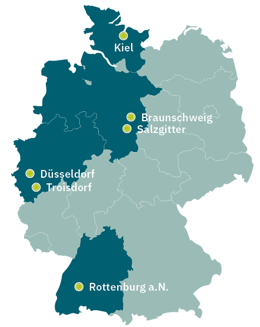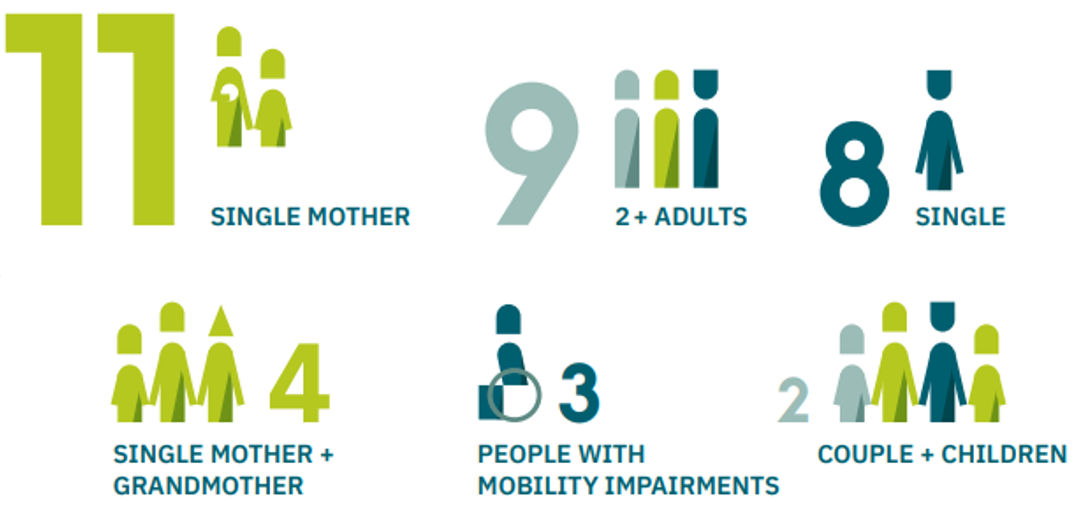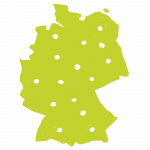We empower Cities in Refugee Reception
The Re:Match pilot project matches refugees to welcoming German partner cities based on the needs and capacities on both sides. Through this, Re:Match enables better planning and future prospects for both refugees and cities alike.
Participating cities can actively shape the reception of refugees by providing Re:Match with detailed information about their services and local capacities. This way, the project enables a more direct, suitable and plannable relocation and reception process for cities and protection seekers, thereby paving the way for successful integration.

How it works – Step by Step
The opportunity offered by Re:Match to have a say and the conscious decision to accept the match in a city creates a noticeably increased commitment and readiness to integrate among those seeking protection. We really appreciate that.
The state capital Düsseldorf is happy to participate in Re:Match because we are convinced of the idea and see the opportunity for integration and participation. Although the funding provided by the project was not a decisive incentive for us, it did enable us to support an important project: our cooperation partner “Hispi – Hilfe bei der sprachlichen Integration” [Language integration assistance] was able to implement an integration course in the form of the “Hispi4U” project for those seeking protection in Düsseldorf via Re:Match and other people, which was very well received and strongly supported integration.
The Re:Match process has made us more aware locally of what is important for people seeking protection – and of who all needs to be brought to the table to make reception and integration a success.
We took part in the Re:Match pilot project to work towards creating a better distribution and reception process for protection seekers. Re:Match takes into account what we consider to be particularly important from a municipal perspective: a well-tailored distribution process that is geared both towards the cities’ capacities and the needs and preferences of those seeking protection.
In more rural towns like ours, it sometimes happens that buses arrive with people seeking protection and they almost want to turn around because they don’t know the town and think there are few opportunities here. That didn’t happen with Re:Match because they already knew what to expect. There is a clearer idea of our city and people know that they will also find a good infrastructure here and that they can quickly get their own apartment, for example. It is also very important that the people seeking protection were involved themselves, were asked and made a conscious decision to do so – that is a completely different attitude.
Which cities participated in Re:Match in 2023? Who was matched and relocated to Germany ?
Welcoming cities did not only participate by receiving protection seekers via the Re:Match project but were also involved in programme co-design, motivated by the desire for a system that considers dynamic service availability and complementarity with refugees’ needs, backgrounds, and preferences. Together with the Re:Match team, they keep illustrating how city-level governments can provide sustainable pathways for solidarity in Germany and Europe more broadly.





 We will provide you with all relevant information before the arrival of the matched refugees, so your city has time to prepare all necessary steps. Upon the refugees’ arrival, they shall be registered in your city and apply for temporary protection. We will closely support you in the entire process of the refugees’ relocation to your city.
We will provide you with all relevant information before the arrival of the matched refugees, so your city has time to prepare all necessary steps. Upon the refugees’ arrival, they shall be registered in your city and apply for temporary protection. We will closely support you in the entire process of the refugees’ relocation to your city.  We rely on your feedback to complete and learn from the project. For this purpose, we will hold a final meeting with all partner cities to evaluate the pilot phase and test the matching model’s scalability.
We rely on your feedback to complete and learn from the project. For this purpose, we will hold a final meeting with all partner cities to evaluate the pilot phase and test the matching model’s scalability.


